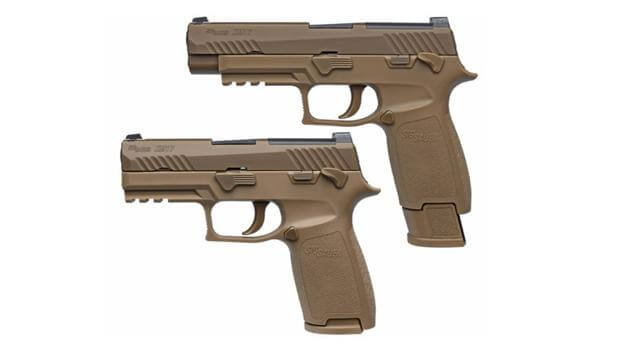The Army today confirmed the caliber for its new Modular Handgun System will be 9mm, one week after the service announced it selected a version of Sig Sauer’s P320 to replace the M9 service pistol.
Army officials sent out a press release with additional details on the MHS but did not explain why the service chose 9mm, a decision that Military.com asked the Army to explain its reasoning behind.
The selection of 9mm is a shift from one of the goals of the MHS effort. Army officials at Maneuver Center of Excellence said in 2014 that the Army and other services want a sidearm chambered for “a round that will have better terminal effects -- or cause more damage -- when it hits enemy combatants” than the current 9mm round.
The U.S. military replaced the .45 caliber 1911 pistol with the M9 in 1985 and began using the 9mm NATO round at that time. The contract allows the Army and other services to procure Sig Sauer’s proposed XM1152 Full Metal Jacket, XM1153 Special Purpose ammunition and training rounds.
Sig Sauer beat out Glock Inc., FN America and Beretta USA, the maker of the current M9 service pistol, to win the MHS contract that's worth up to $580 million.
“The Army determined that this MHS (full size handgun, compact handgun, ammunition, and ancillary components) was the best value in terms of its performance capability, the terms and conditions of the vendor’s proposal, and price,” according to the release.
“The contract ceiling is $580M which is sufficient to procure Army requirements, other service requirements, and potential Foreign Military Sales requirements.”
As the Army fields MHS, the full size variants will replace the M9 handgun and the compact variants will replace the M11 handguns. The M9 and compact M11 handguns will eventually be phased out of the Army inventory.
The Army had released past estimates that the service had planned to purchase about 280,000 handguns, according to Program Executive Office Soldier officials. The Army also plans to buy approximately 7,000 sub-compact versions of the handgun to replace the M11.
The other military services participating in the program may order an additional 212,000 systems above the Army quantity.
Military.com is still waiting on the Army to release the unit costs of the full-size and compact models of the MHS and how many pistols it intends to purchase.
“This contract allows for the procurement of handguns and ancillary components for up to ten years and ammunition for up to five years,” the release states. “The government is not obligated to use the entire $580M contract ceiling.”
The Army launched the long-awaited XM17 Modular Handgun System competition in late August 2015. It took 17 months to complete.
A key element of the competition’s testing was a user assessment comprised of 135 uniformed service members from across all DoD services, the release states, but does not provide an additional details.
The Army anticipates that the first MHS weapons will be provided to units designated to participate in Initial Operational Testing in the fourth quarter of fiscal 2017, the release states.
“Subsequent fielding for the Army will be executed over time and in alignment with all Army capability fielding priorities,” according to the release.









